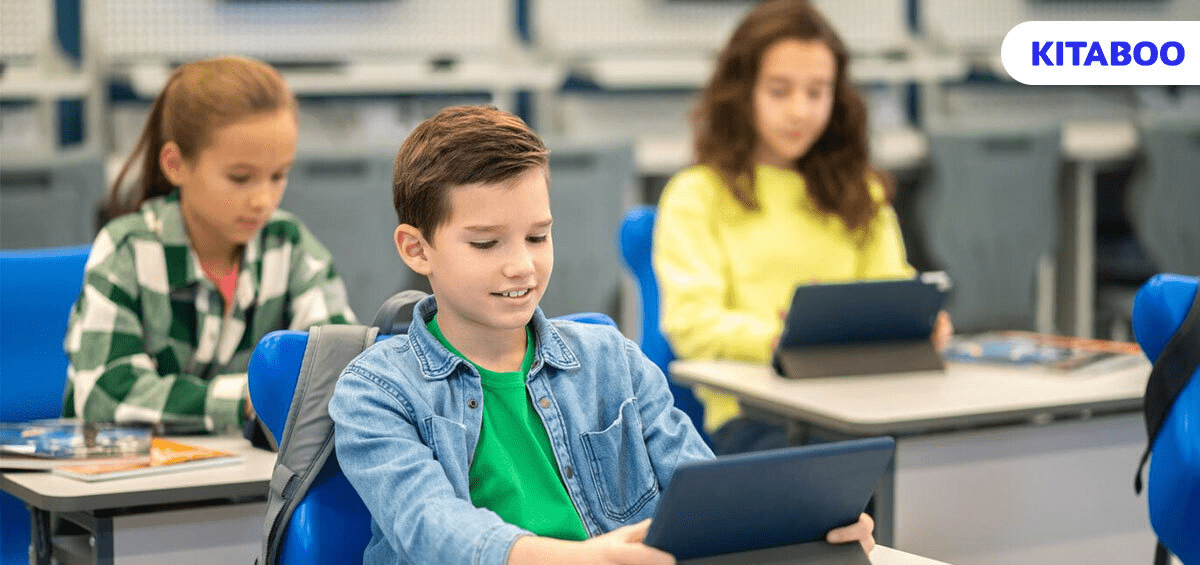In the dynamic landscape of digital learning, the demand for accessible offline learning has gained prominence. As the importance of offline learning grows, so does the challenge of effectively tracking learners’ activities in environments with intermittent internet connectivity.
KITABOO, an innovative digital textbook platform at the forefront of eLearning solutions, has recently introduced groundbreaking features that facilitate offline activity tracking.
This advancement emerges as a solution to this challenge, ensuring a continuous and uninterrupted learning experience.
In this article, we will delve into the various functionalities of KITABOO that empower users to address the challenges of offline learning. Before we explore them, let’s understand what the challenges of tracking offline activity are first.
Table of Contents:
I. Navigating the Hurdles of Offline Activity Tracking
- xAPI-Compliant Wrapper Applications
- SCORM/AICC-Compliant Wrapper Applications
- Applications with Preloaded Content
II. Updating Challenges in Offline Learning
III. Revolutionizing Offline Activity Tracking With KITABOO
- Offline Access through Content Download
- Generate Annotations
- Take Quizzes
- Collaborative Note Sharing
- Explore Interactivity in an Offline Mode
- Data Synchronization
IV. Wrapping Up!
Navigating the Hurdles of Offline Activity Tracking
The challenges associated with tracking offline learning activities are multifaceted. To effectively address these challenges, it is essential to understand the options available for offline eLearning.
These include the following:
1. xAPI-Compliant Wrapper Applications
Overcoming tracking challenges associated with standalone apps, xAPI-compliant wrapper apps reduce reliance on LMS interaction. This approach allows launching content directly from the app and sending learner data to a separate Learning Record Store (LRS) for comprehensive reporting.
KITABOO aligns with this strategy, ensuring a smooth offline learning experience with enhanced tracking capabilities.
2. SCORM/AICC-Compliant Wrapper Applications
Integrating with Learning Management Systems (LMS), these wrapper apps facilitate responsive eLearning in both online and offline modes.
However, without an offline app for the LMS, a separate solution is required to manage learner validation, course assignments, data tracking, and more. An LMS operating in isolation falls short of unlocking its complete capabilities.
Thus, it is imperative to integrate any LMS system with a secure digital publishing platform, such as KITABOO. As the world’s leading digital publishing and content delivery platform, KITABOO streamlines this process.
The platform seamlessly integrates with renowned LMSs like Moodle, Sakai, Schoology, etc, offering an all-in-one solution for offline access and seamless tracking.
3. Applications with Preloaded Content
To tackle the challenge of tracking offline learning, some eLearning solutions resort to packaging a fixed set of content into an app.
While this allows for offline access, activity tracking is often compromised. KITABOO, on the other hand, distinguishes itself by providing robust offline content access with comprehensive activity tracking features.
Updating Challenges in Offline Learning
Updating content in the fast-paced landscape of offline learning can be a considerable challenge.
Traditional methods often struggle to provide dynamic updates, especially in a Bring Your Own Device (BYOD) environment.
KITABOO, however, allows you to deliver courses with offline delivery, dynamic updates, and full Experience API analytics. This ensures that learners receive the latest content instantly, regardless of their device or connectivity status.
Revolutionizing Offline Activity Tracking With KITABOO
1. Offline Access through Content Download
One of the key features of KITABOO is its robust offline content access capability. Users can effortlessly download educational materials, textbooks, and other resources for offline consumption.
This functionality proves invaluable in environments where internet connectivity is unreliable or unavailable, allowing users to access their study materials anytime, anywhere.
KITABOO ensures that learners have a seamless learning experience, irrespective of connectivity constraints.
2. Generate Annotations
In the realm of effective learning, the ability to annotate content is a game-changer. KITABOO recognizes this and offers users the option to create annotations even in offline mode.
This feature enables learners to highlight key concepts, jot down important notes, and engage actively with the content.
Annotations made offline are synchronized once the user regains internet connectivity, ensuring a cohesive and synchronized learning experience across devices.
3. Take Quizzes
KITABOO takes offline learning to the next level by enabling users to attempt quizzes even without an active internet connection.
This feature is particularly beneficial for learners in remote areas or those facing connectivity challenges. Learners can assess their understanding of the material, receive instant feedback, and track their progress, all while offline.
Once the user regains internet connectivity, quiz results are seamlessly synchronized with the server, providing a comprehensive overview of the learner’s performance.
4. Collaborative Note Sharing
Collaborative learning is a cornerstone of modern education. KITABOO facilitates this by allowing users to share notes with their study groups, even in offline mode.
Learners can collaboratively annotate content, share insights, and enhance their understanding collectively.
The shared notes are synchronized when an internet connection is reestablished, fostering a collaborative learning environment that transcends geographical boundaries.
5. Explore Interactivity in an Offline Mode
KITABOO goes beyond mere content consumption by providing users with the ability to access interactive elements in offline mode.
Learners can immerse themselves in a rich and interactive learning experience without the need for a constant internet connection. This includes interactive simulations, multimedia content, or engaging activities.
This feature not only enhances the quality of offline learning but also ensures that learners stay actively engaged with the educational material.
6. Data Synchronization
A crucial aspect of offline activity tracking on KITABOO is the seamless synchronization of user data once an internet connection is re-established.
All progress made, including quiz results, annotations, and collaborative notes, is automatically synced with the server.
This ensures that learners’ data remains up-to-date and consistent across devices, regardless of their offline or online learning activities.
This synchronization mechanism guarantees a fluid transition between offline and online learning modes, preserving the integrity of the learning experience.
Wrapping Up!
In conclusion, KITABOO’s offline activity tracking features revolutionize the way learners engage with educational content in environments with limited internet connectivity.
As we navigate the evolving landscape of education technology, KITABOO stands as a beacon of innovation. The platform is committed to empowering learners to overcome connectivity challenges and embrace an immersive learning journey.
As businesses and educational institutions navigate the complexities of offline learning, KITABOO invites you to explore the transformative capabilities of its platform. Elevate your educational experience by embracing the future of eLearning.
Visit our website and discover the power of uninterrupted, interactive, and collaborative learning with KITABOO. Embark on your offline learning adventure today.
Contact our expert team now and get started!
To know more, write to us at KITABOO@hurix.com.
Suggested Reads:
Discover How An Ebook Conversion, Publishing & Distribution Platform Can Help You
Kitaboo is a cloud-based content platform to create-publish & securely distribute interactive mobile-ready ebooks.
You May Also Like








